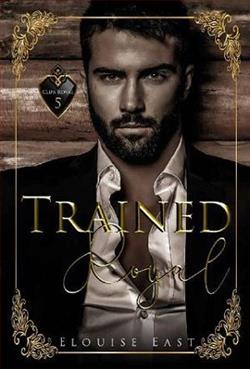Page 21 of A Bride for His Majesty s Pleasure
‘I am supposed to be,’ Max agreed. ‘But my meeting was cancelled.’ It was the truth, after all—even if he himself had been the one to do the cancelling. ‘And I decided it would be a good idea if we were to visit your castle together. It will help to reassure people of our unity, and of course of our commitment to one another and to them.’
Ionanthe gave a small shiver, despite the delicious warmth of the car’s interior. ‘I really don’t think that would be a good idea,’ she protested.
‘You don’t? Why not?’
Why not? Because her escape had been about preventing any intimacy between them, not promoting it. But of course she could hardly tell him that.
‘My grandfather didn’t use the castle very much. It’s old-fashioned, and not very well equipped with mod cons.’
‘Really? I understood from your sister that your parents had spent what she described as “a fortune” on installing modern plumbing and central heating.’
Ionanthe’s heart sank. Her parents had modernised the castle—much to the anger of her grandfather, who had never ceased complaining about what he considered to be a waste of money. Eloise had taken the same attitude as their grandfather, begrudging the money spent and claiming that such luxuries as bathrooms and central heating were wasted on the staff who looked after the castle.
‘That was nearly twenty years ago. I’m not even sure the central heating system will still be working.’
‘If it isn’t then we shall just have to find some other way to keep warm, then, shan’t we?’
The swift hiss of Ionanthe’s betraying breath should have pleased him, but instead it made him feel like stopping the car and taking her in his arms.
To punish himself, Max continued briskly, ‘After all, I’m sure your staff must have found one. It would be uncomfortable if not impossible for them to endure the cold of the mountain winters if they had not.’
Was Max genuinely expressing concern for others? Or was he simply using them as a means of mocking her?
‘The boiler and the fires are fed by logs cut from trees that fall or have to be felled,’ she explained. ‘It is hard work, and the logs have to be eked out carefully when there are bad winters.’
‘You make it sound very unpleasant, but I dare say those who live there are accustomed to it. Or do they wish for an easier life in a less harsh environment?’
Max’s question made Ionanthe tense. What was the true purpose of his questions and his obvious determination to visit the mountains? Was he merely making conversation, or did he have a darker purpose in suggesting that her people might wish to abandon the mountains and live somewhere else? It was, after all, beneath the mountains that the coal lay—on land he owned, which bordered what was now hers.
What was h
e trying to prove in giving Ionanthe the opportunity to confide in him? Max wondered grimly.
She wasn’t going to play Max’s game, Ionanthe decided. She had already learned the painful cost of doing so, hadn’t she?
‘It is their choice to live where and how they do,’ she answered, giving a small shrug as she did so in an attempt to express a lack of interest in the subject that would bring his questions to an end.
But Max gave her a hard look and suggested, in an even harder voice, ‘And since you do not have to endure their hardship it is of no concern to you? Your sister expressed much the same view. I should perhaps have expected that you would share it.’
Was he trying to suggest that she didn’t care about the lives of those who depended on her? Now Ionanthe was really angry.
‘For your information, I do not slavishly adopt the views of others. I formulate my own. And if you knew anything about history then you would know that in many instances—from the Scottish Highland clearances to the wholesale movement of people from their terraced houses to the planners’ rabbit hutch post-war flats—when people have been taken from their environment and resettled against their will it has led to the destruction of their sense of community, adding to their ills rather than lessening them. If my people wish to move and change their way of life then of course I shall do my best to aid them in that endeavour. But I will never force it upon them.’
There was real passion in her voice, Max acknowledged. Passion and conviction. But was there also honesty?
They were approaching the turn-off they needed to take from the coast road, but before Ionanthe could let Max know it was coming up he was signalling to make the turning.
As though he knew what she was thinking, he told her curtly, ‘I visited the castle with Eloise, shortly before our marriage.’
‘She wouldn’t have liked that.’
The words were out before Ionanthe could stop them. Now he would think she was jealous and mean as well as everything else, Ionanthe thought miserably, unable to look at Max for fear of what she might see in his eyes.
‘Eloise was always a city and bright lights person,’ she explained lamely. ‘Neither she nor our grandfather liked the castle.’
‘But you did?’ Max guessed.
‘It was my family home when our parents were alive. My mother loved it, and because my father loved her he was happy for them to make their home there.’















